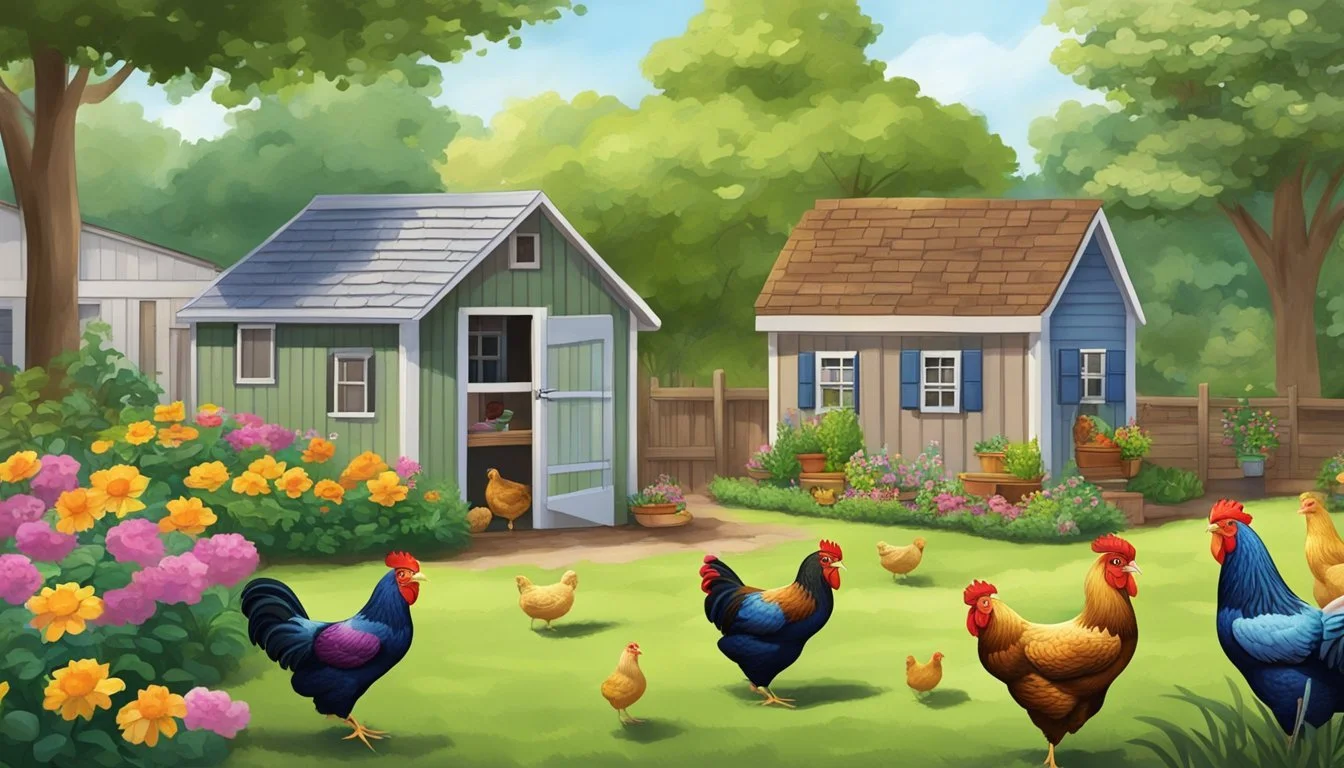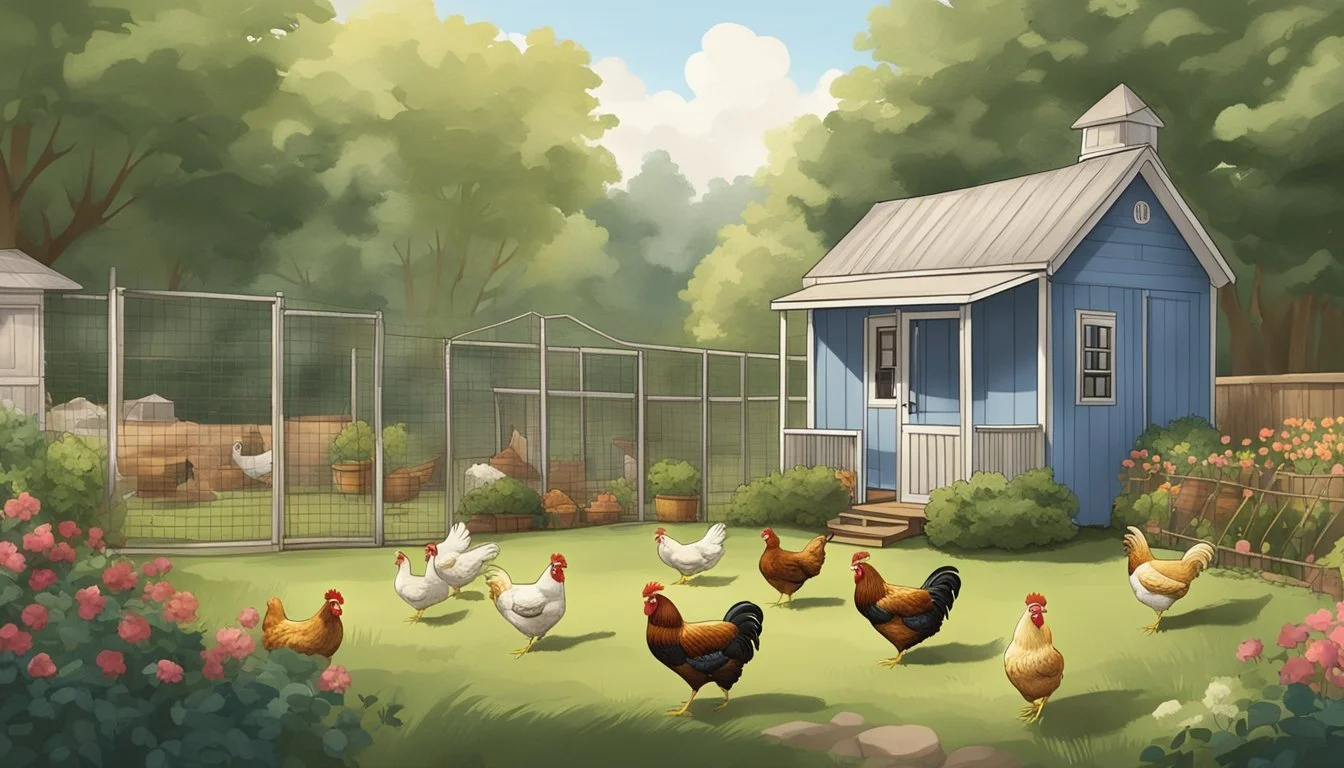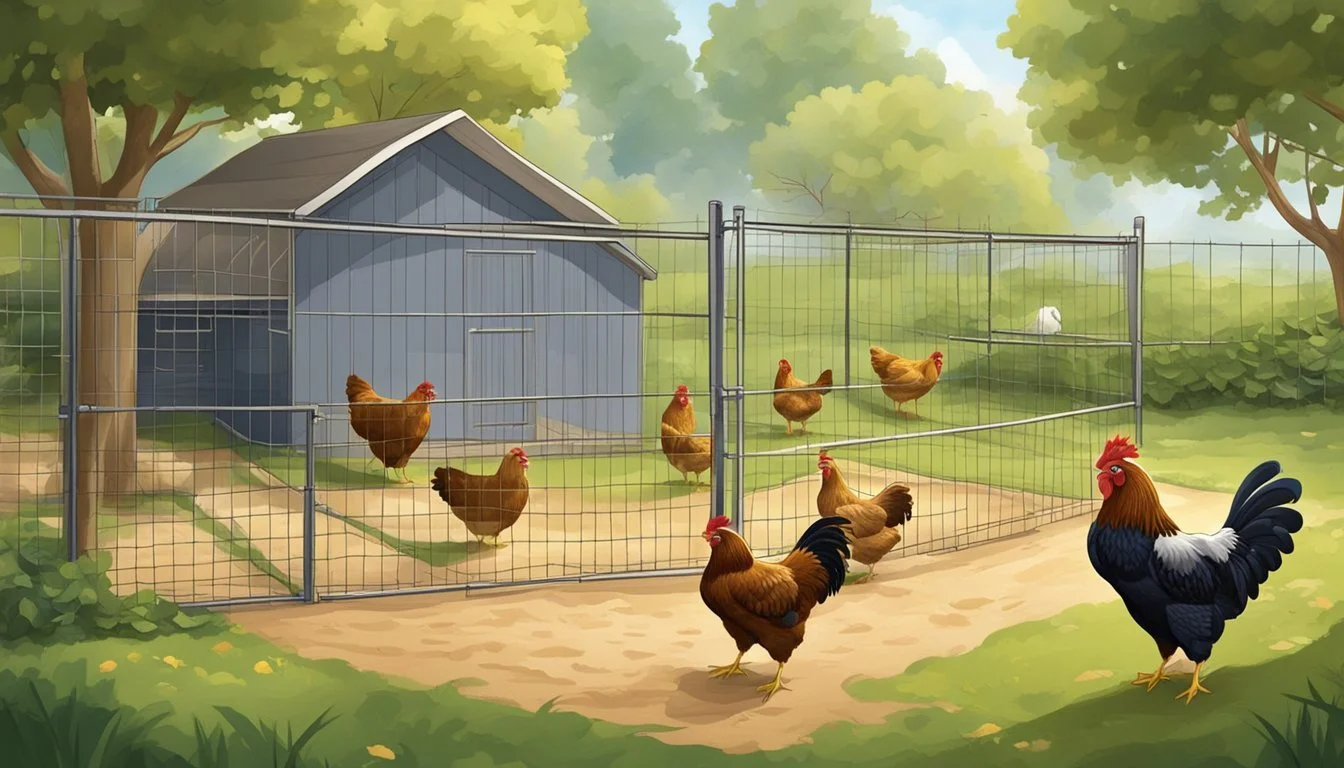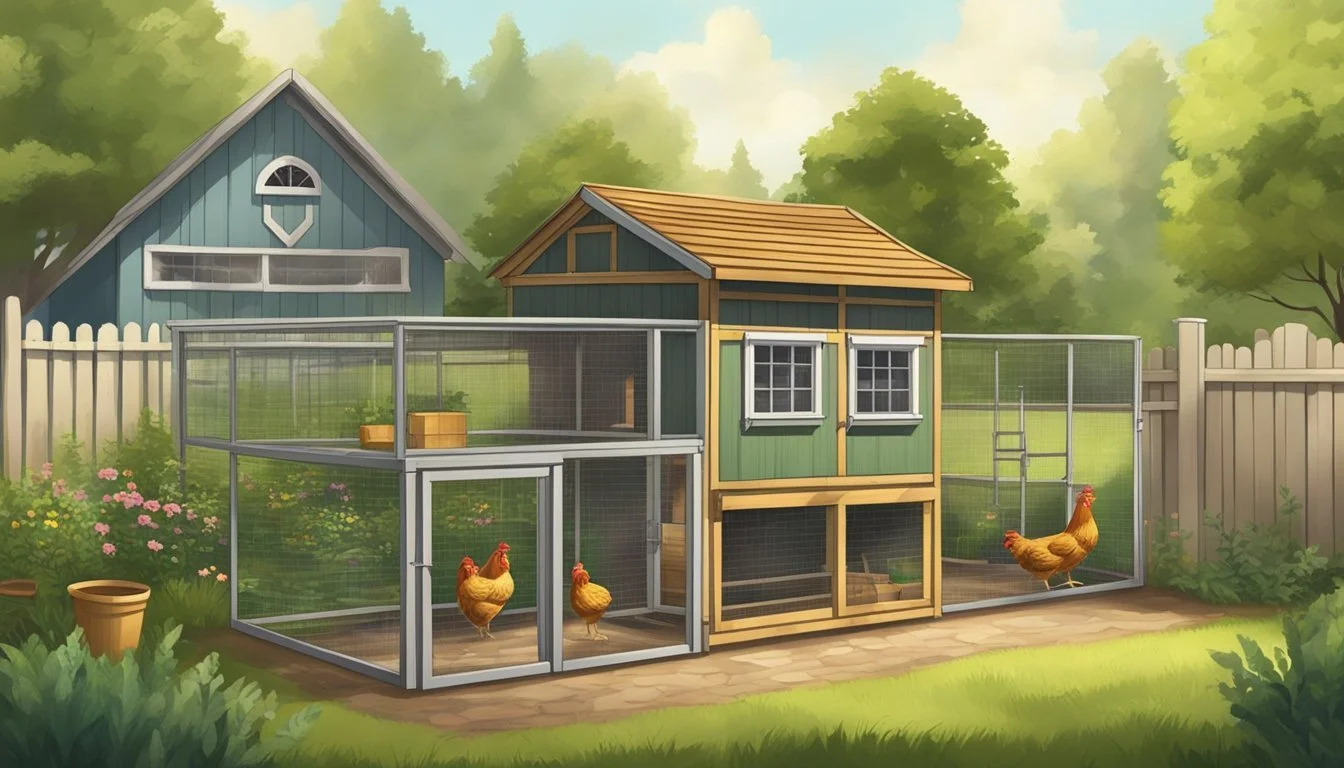Keeping Backyard Chickens in Carrollton, TX
Essential Guidelines for Urban Poultry Farmers
The city of Carrollton, Texas offers a unique opportunity for residents to practice small-scale, sustainable agriculture through the keeping of backyard chickens. As a community increasingly interested in self-sufficiency and locally sourced food, Carrollton's urban chicken keepers can enjoy the pleasures and benefits of raising their own chickens. This practice contributes not only to the household's supply of fresh eggs but also encourages responsible pet ownership and provides an educational experience for families regarding the source of their food.
To embark on the journey of raising backyard chickens in Carrollton, regulations have been put in place to ensure that the activity is carried out in a manner that respects both the well-being of the chickens and the community at large. Potential chicken keepers are required to apply for an annual permit, with a standard fee, and are limited to a maximum number of six hens per household. Roosters are prohibited to prevent noise disturbance, and proper housing, such as a coop, must be provided to contain and protect the chickens, adhering to specified size restrictions.
These guidelines ensure that the incorporation of backyard chickens into Carrollton home life is done harmoniously, considering the concerns of neighbors and the city's urban setting. The community's collective adherence to these rules helps to maintain a balance where residents can revel in the joy of raising chickens while contributing positively to the urban fabric of Carrollton.
Understanding Carrollton's Chicken Ordinances
In Carrollton, TX, residents interested in keeping backyard chickens must navigate a series of city ordinances and regulations. These laws ensure the welfare of the chickens, preserve neighborhood harmony, and maintain public health.
City Regulations and Permits
The City of Carrollton requires residents to obtain an annual permit to keep backyard chickens. It is a straightforward process that involves paying a $20 fee every year. Residents can house up to six chickens, but roosters are not permitted. The permit acquisition process includes a scheduled inspection by an Animal Service Officer to ensure compliance with the city's standards.
Zoning Laws and Property Requirements
Carrollton's zoning laws stipulate that chickens may only be kept on residentially zoned single-family lots. Additionally, the city enforces specific property requirements for the chickens' housing. Coops must be well-maintained and are limited in size; they cannot exceed 80 square feet or be taller than 8 feet. Owners must ensure that chickens have adequate shelter but do not roam freely on the property.
Penalties and Fines for Non-Compliance
Carrollton enforces its chicken ordinances and will impose penalties if residents do not comply with local laws. Fines vary depending on the nature and severity of the violation. Non-compliance might include having more than six chickens, keeping roosters, inadequate coop conditions, or the lack of a valid permit. Residents must adhere to these local ordinances to avoid penalties and to responsibly enjoy the benefits of raising backyard chickens.
Planning Your Chicken Coop
When planning a chicken coop in Carrollton, TX, residents must consider city regulations governing space, design, and sanitation to ensure both the welfare of the chickens and adherence to local laws.
Location and Space Requirements
A chicken coop must be strategically placed on the property within the boundaries of Carrollton's ordinances. The coop should:
Be no larger than 80 square feet and not exceed 8 feet in height.
Maintain a distance from any property line to ensure compliance with local zoning laws.
Provide sufficient space for nesting boxes and roosts adequate for up to 6 chickens, as no roosters are allowed.
Designing for Shelter and Protection
The coop's design must offer shelter from weather and protection from predators. It has to include:
Secure fencing around the coop to keep chickens contained and deter predators.
A roof and walls that provide shelter from the elements and further enhance security.
Ample ventilation for air circulation but shielded enough to prevent predator intrusion.
Maintaining Sanitation and Waste Management
Maintenance of sanitation is crucial to prevent odors and pests. A few key practices include:
Regularly removing excrement, placing it in a waste container, and ensuring it is sealed to minimize odor.
Planning for easy access to the coop for cleaning and waste removal.
Installing surfaces and materials within the coop that can be easily sanitized as part of regular maintenance.
Selecting and Raising Your Flock
Raising backyard chickens requires thoughtful consideration of local regulations, breed selection, and ongoing care. This section provides guidance on choosing suitable chicken breeds for Carrollton, TX, caring for chicks and mature chickens, and managing roosters within a flock.
Choosing the Right Chicken Breeds
When selecting chicken breeds, prospective owners should consider the size of their coop and local climate. Leghorns, for example, are a popular breed that adapts well to various climates and is known for its prolific egg-laying capabilities. In Carrollton, up to six chickens may be kept, but no roosters are allowed. Here is a simple table of characteristics to consider when choosing breeds:
Breed Egg Production Climate Tolerance Space Needed Leghorns High Adaptable Moderate Easter Eggers Moderate to High Adaptable Moderate
Caring for Chicks and Mature Chickens
Proper care for chicks involves maintaining a warm and safe brooder environment, offering starter feed, and ensuring clean water is available. As they grow into mature chickens, the focus shifts to providing a balanced diet, fresh water, and a clean coop to prevent disease. In Carrollton, the coop must not exceed 80 square feet and must be less than 8 feet tall. Regular coop maintenance and health checks are key for the well-being of chickens.
Managing Roosters in the Flock
Although residents of Carrollton cannot keep roosters, understanding rooster management is essential for those in other areas. A rooster can be beneficial to a flock for its protective nature and breeding purposes. However, they can also be aggressive and noisy. Those choosing to keep roosters should ensure that their local ordinances allow for them and that they are prepared to manage the bird's behavior and noise levels.
Feeding and Healthcare for Your Chickens
Proper nutrition and healthcare are crucial for maintaining a healthy flock of chickens. Understanding food sources, disease prevention, and care routines helps keep chickens thriving in any backyard setting.
Nutrition and Food Sources
Chickens are omnivores and require a balanced diet that includes grains, protein, greens, and minerals. A well-formulated commercial feed can meet most of their nutritional needs. These feeds often come in different forms, like pellets or crumbles, and are tailored to different life stages—starter, grower, and layer.
Grains: Provide energy and should be present in most feeds.
Proteins: Essential for growth and egg production. Options include mealworms and seeds.
Greens: Access to fresh greens aids in digestion and provides essential nutrients.
Calcium: Particularly for laying hens, to ensure strong eggshells.
Clean Water: Must be available at all times to prevent dehydration and overheating.
Preventing and Treating Common Diseases
Chickens can be prone to various diseases that can be mitigated with proper care and biosecurity measures. Common ailments include respiratory infections, parasites, and fungal infections.
Good Coop Hygiene: Regular cleaning reduces disease spread.
Parasite Control: Keeping coops dry and clean helps prevent mites and lice.
Quarantine: New or sick birds should be isolated to prevent disease transmission.
Prompt Treatment: Early detection and treatment of illnesses are critical.
Vaccination and Regular Check-Ups
Vaccinations play a vital role in preventing infectious diseases in poultry. Regular check-ups by a veterinarian knowledgeable in avian medicine can help catch potential health issues early.
Vaccinations: Follow recommended vaccine schedules for diseases such as Marek's disease and Newcastle disease.
Annual Check-Ups: Helps ensure that any nutritional deficiencies or health concerns are addressed promptly.
Community and Neighbor Relations
Maintaining positive relations within the community is a crucial aspect for backyard chicken owners in Carrollton, TX. They must manage noise, odors, and potential commerce stemming from their activities, ensuring they adhere to local regulations and maintain good relationships with their neighbors.
Dealing with Noise and Odors
Noise: Chicken owners should ensure that their fowl do not disturb the surrounding neighborhood. Since roosters are not permitted due to their crowing, noise should be minimal. However, owners must still be mindful of any potential disturbances caused by the hens.
Odors: Regular cleaning of coops is required to manage odors. Proper waste management and maintaining good sanitation practices will prevent odor-related issues that might affect neighbors.
Eggs, Meat, and the Home Business Aspect
Eggs: While chickens are a source of fresh eggs, any surplus must be managed appropriately. It's common for owners to share or sell eggs within the community. Meat: Backyard chickens are more often kept for their eggs rather than meat. If meat production is a goal, owners must do so considering all Carrollton regulations. Business: Selling eggs or meat on a small scale can be considered a home business. Regulations around such sales should be followed, ensuring that products are safe to consume and sold in a way that does not disrupt the neighborhood.
Educating Neighbors and Local Awareness
Education: Chicken owners have the responsibility to educate their neighbors about the benefits of keeping chickens as pets or for their egg-producing abilities. Dispelling misconceptions may create a more supportive community. Awareness: Promoting local awareness about sustainable living practices, including raising backyard chickens, can be beneficial. It encourages community growth and understanding, as long as it aligns with Carrollton's regulations and respects the interests of all residents.
Legal Considerations and Restrictions
When keeping backyard chickens in Carrollton, TX, residents must navigate a series of legal considerations and restrictions to ensure compliance with local and state laws. It's imperative to understand the nuances of city ordinances and how they align with state regulations.
Distances from Schools, Churches, and Other Residences
Carrollton's city ordinances stipulate specific distance requirements for chicken coops in relation to schools, churches, and neighboring dwellings. Coops must:
Be positioned at a minimum prescribed distance from these buildings.
Adhere strictly to property line setbacks to maintain harmony with the local community.
Understanding Livestock Classification in Carrollton
Within Carrollton, chickens are considered livestock and are subject to related ordinances. Other farm animals, such as ducks, geese, turkeys, horses, sheep, and goats, may also be classified under livestock; however, the specific regulations for those animals may differ. It is vital that residents:
Verify the classification and stipulations for each type of livestock.
Ensure no prohibited species are kept within urban zones, as different rules may apply to urban and rural areas.
State Law vs. City Ordinances
The interaction between state law and city ordinances can be complex. Participants should note that:
Carrollton's local ordinances are designed to align with Texas state law. When conflicts arise, state law may preempt local policy.
All keepers of backyard chickens need to confirm their practices are within the framework of both the Health and Safety Code, Chapters 821-829, and Chapter 91 of the City ordinances.
Safety and Etiquette for Free-Ranging Chickens
When raising free-ranging chickens in Carrollton, TX, safety measures and good practices ensure the welfare of both the chickens and the local community. Ideal management includes setting clear boundaries, protecting the environment and wildlife, and fulfilling an owner's responsibilities.
Setting the Boundaries for Your Flock
To responsibly allow chickens to roam free, owners must establish firm perimeters. Fencing is essential to confine chickens to designated areas, reducing the risk of them straying onto neighboring properties or into streets where they could cause disruptions or be injured. Moreover, a physical barrier is a crucial defense against local predators like coyotes and bobcats. Owners should use robust materials and check fences regularly for breaches that could allow chickens to escape or predators to enter.
Protecting Local Wildlife and Environment
Free-ranging chickens can impact local ecosystems if not managed correctly. It’s important to maintain a balance where chickens can naturally forage without harming native wildlife or over-disturbing habitats. In Carrollton, TX, this includes periodically moving feeding areas to prevent overgrazing and potential pest attraction. Sustainable practices should also account for the restraint of chickens during the nesting and breeding periods of local wildlife species to minimize disturbance.
The Responsibilities of Free Range Chicken Owners
The responsibility of free range chicken ownership extends beyond the birds themselves. Owners must ensure their chickens do not become a nuisance to neighbors. This involves managing noise levels, controlling odors, and preventing pests like flies and rodents that might be attracted to chicken feed or waste. Additionally, regular health checks for signs of injury or disease are crucial, as diseases can spread to other backyard flocks and even to humans in some cases. An owner's due diligence contributes to the overall health and safety of the local community.
Handling Eggs and Processing Chickens
Keeping backyard chickens in Carrollton, TX allows residents to enjoy fresh eggs and, for some, the process of chicken butchering for meat. It is essential to understand the proper techniques for egg collection and storage, as well as the regulations and methods for processing chickens.
Collecting and Storing Fresh Eggs
Collecting eggs from backyard chickens should be done regularly to ensure freshness and prevent the eggs from becoming soiled or damaged. One should ideally collect eggs at least once a day from the nesting boxes to ensure they remain clean and are less likely to be broken.
Here is a simple guideline for egg storage:
After collection: Store eggs pointed end down to maintain freshness.
Cleaning eggs: Wipe off any dirt with a dry cloth; washing can remove the protective bloom.
Refrigeration: Immediately store in a refrigerator which should be kept at or below 40°F (4°C) to optimize shelf-life.
Understanding the Process of Chicken Butchering
Processing chickens in Carrollton involves several steps, and one must comply with local ordinances regarding the slaughter of animals. Residents are permitted to keep a small number of chickens, typically for egg production, but if butchering is anticipated, they should educate themselves on humane and sanitary methods.
A brief outline of the processing steps includes:
Preparation: Fast chickens for 8-12 hours to clear the digestive tract.
Humane slaughtering methods: Various techniques can be applied, but all should result in rapid unconsciousness followed by death.
Plucking feathers: This can be done by hand or with a mechanical plucker post-slaughter.
Evisceration: Removal of the internal organs must be done carefully to avoid contamination.
Cooling: Quickly cool the carcass to slow bacterial growth, using ice or refrigeration.
Safety is paramount when processing chickens for consumption. Having the proper equipment, maintaining cleanliness, and understanding chicken anatomy are crucial for safety and quality.
Resources and Support for Chicken Owners
In Carrollton, TX, chicken owners have access to a variety of resources and support services. These include local hatcheries for obtaining chickens, supply stores for required equipment, and online platforms for education and community engagement.
Local Hatcheries and Supply Stores
Carrollton residents can source their chickens from local hatcheries, ensuring healthy and well-bred stock. Here's a list of nearby locations where one can purchase chickens, feed, and supplies:
Local Hatcheries: Offer a range of chicken breeds suitable for backyard flocks.
Supply Stores: Provide essential equipment such as coops, feeders, and bedding materials.
Forums, Groups, and Educational Materials
Knowledge sharing and community support are significant for new and experienced chicken owners alike. Carrollton residents benefit from:
Online Forums: Places like BackYard Chickens offer a platform for discussing concerns and sharing tips.
Social Media Groups: Local groups on platforms like Facebook and Pinterest allow users to connect and exchange advice.
Educational Materials: Resources provided by the USDA, as well as local poultry associations, offer guidance on best practices.










